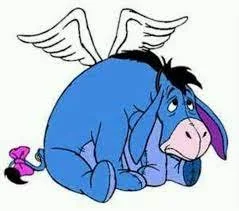Eeyore and Depression
The soul yearns for connection and in order for our souls to develop we need to know others are available to us. Depression can be really lonely and isolating. For a lot of people it begins in early childhood when caregivers were non responsive and/or dismissive. This can leave the child feeling like no one will ever really be there for them. They give up expecting caregivers being responsive to them and view themselves as being not important which brings extreme sadness to the soul.
Eeyore, the donkey from the Winnie-the-Pooh books and movies, is a classic example of a fictional character with depression. He is always pessimistic, sees the downside of everything, and has low self-esteem. He is also often described as being "gloomy" and "depressed." Whilst we don’t know about Eeyore’s early family situation, we do know that he is suffering from long term depression.
The symptoms of Eeyore's depression are consistent with those of major depressive disorder, a mental illness that affects millions of people worldwide. These symptoms include:
· Depressed mood most of the day, for most days
· Loss of interest or pleasure in activities once enjoyed
· Significant weight loss or gain (not due to dieting)
· Trouble sleeping or sleeping too much
· Loss of energy or increased fatigue
· Difficulty thinking, concentrating, or making decisions
· Restlessness or feeling slowed down
· Feeling worthless or guilty
· Thoughts of death or suicide
Thankfully, Eeyore's friends in the Hundred Acre Wood are aware of his depression, but they love him and accept him for who he is. They are always there for him, even when he is being negative. This is an important reminder that people with depression need love and support from their loved ones.
Here are some things you can do to help someone with depression:
· Be patient and understanding
· Encourage your loved one to seek professional help
· Offer practical support, such as helping with chores or running errands
· Spend time with your loved one, even if they don't seem to want to
· Let them know that you care about them and that you are there for them
Depression is a serious mental illness, but it is treatable. With the right support, people with depression can live happy and fulfilling lives.
Recovery Treatments
There are many different treatments available for trauma recovery. Some of the most common treatments include:
Eye Movement Desensitization and Reprocessing (EMDR): EMDR is a psychotherapy that uses eye movements, taps, or tones to help people process traumatic memories and reduce their symptoms.
Parts therapy: Parts therapy is a type of therapy that helps people identify and work with the different parts of themselves, including the parts that are affected by trauma.
Exposure therapy: Exposure therapy is a type of therapy that helps people face their fears and gradually reduce their anxiety.
Support groups: Support groups can provide a safe place for people to share their experiences and get support from others who have been through similar experiences.
The best treatment for you will depend on your individual needs and circumstances. It is important to talk to a therapist to find the right treatment for you.
I hope this blog has been helpful. If you or someone you know is struggling with depression, please reach out for help. There are many resources available to you.
References
"The Eeyore Syndrome: Major Depressive Disorder" by Christopher J. Fairburn and Ruth E. Smith. This article provides a detailed overview of the symptoms, causes, and treatment of major depressive disorder, with a focus on the similarities between Eeyore's character and the disorder.
"Eeyore: A Pessimist's Guide to a Beautiful Life" by Anne Moss. This article explores the positive aspects of Eeyore's character, such as his resilience, his ability to find humor in difficult situations, and his willingness to accept help from others.
"How to Help Someone with Depression" by the National Institute of Mental Health. This website provides information on how to recognize the signs of depression, how to talk to someone about their depression, and how to get help for someone with depression.

